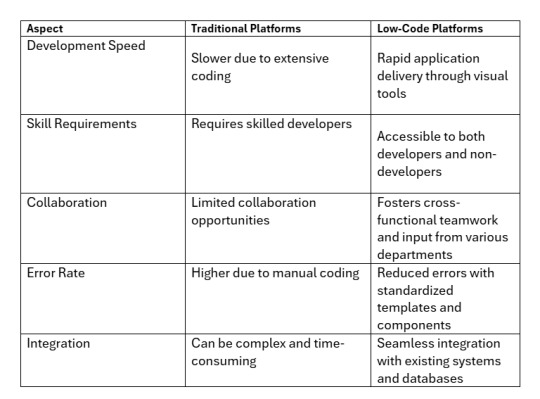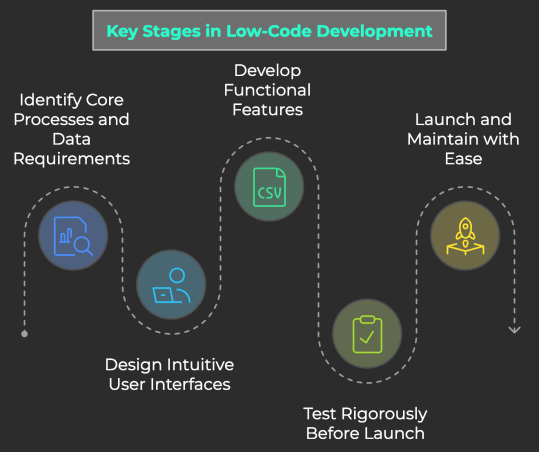#low code no code application development
Explore tagged Tumblr posts
Text
Empower Your Business with OmnePresent's Low Code No Code Services for Seamless Application Development
Experience a revolution in custom solutions with OmnePresent Technologies' Low Code No Code services. Elevate your business with streamlined processes, accelerated application development, and unparalleled innovation. Our LCNC services empower both technical and non-technical users, unlocking the true potential of your enterprise. Explore a world where efficiency meets cost reduction, transforming the way you work. Dive into the future of technology-driven solutions with OmnePresent, where we make custom solutions easy and accessible for all.
0 notes
Text
Enterprise Application Platform: Future Trends and Innovations
The Enterprise Application Platform (EAP) landscape is constantly evolving, driven by technological advancements and changing business needs. Understanding the future trends and innovations in this area is crucial for businesses looking to stay competitive and maximize the benefits of their EAP investments.

Key Future Trends
AI and Machine Learning (AI/ML) Integration: AI and ML are increasingly being integrated into EAPs to automate tasks, improve decision-making, and personalize user experiences.
Low-Code/No-Code Development: These platforms enable citizen developers to build and deploy applications quickly, reducing the reliance on traditional coding and accelerating digital transformation.
Cloud-Native Architecture: EAPs are increasingly being built on cloud-native architectures, leveraging microservices, containers, and serverless computing to improve scalability, flexibility, and resilience.
Edge Computing: Bringing processing closer to the data source, edge computing enables faster response times and improved performance for IoT devices and other edge applications.
Internet of Things (IoT) Integration: EAPs are becoming more adept at integrating with IoT devices, enabling businesses to collect and analyze data from a wider range of sources.
Microservices Architecture: This architectural style allows for the development of applications as a collection of small, independent services, improving flexibility and maintainability.
Serverless Computing: This model allows developers to build and run applications without managing servers, reducing operational overhead and improving scalability.
Enhanced Security: With increasing cyber threats, EAPs are incorporating advanced security features to protect sensitive business data and ensure compliance with industry regulations.
Impact on Businesses
These future trends will have a significant impact on businesses, enabling them to:
Automate complex processes: AI/ML will automate tasks that were previously done manually, freeing up employees for more strategic work.
Develop applications faster: Low-code/no-code platforms will accelerate the development and deployment of new applications.
Improve scalability and flexibility: Cloud-native architectures will allow businesses to scale their applications easily and adapt to changing demands.
Gain real-time insights: Edge computing and IoT integration will provide businesses with access to real-time data from a wider range of sources.
Enhance security: Advanced security features will protect sensitive business data and ensure compliance.
Conclusion
The future of Enterprise Application Platforms is exciting, with numerous innovations on the horizon. By understanding these trends and adopting the right technologies, businesses can transform their operations, improve efficiency, and achieve sustainable growth in the years to come.
Ai Auto code
AI Wave maker
Rapid low code application development platform
Low code platform Enterprise software for application development
Low code application development platform or Low code platform for application development
What is Low code app development platforms
Composable low code isvs
Java-based low code platform
Composable isvs
RAD studio-Rapid application development software platform
APAAS-application platform as a service
Cloud Low code application development platform
Legacy application modernization solutions
React-native cross-platform mobile application development platform
Compare Wavemaker vs Outsystems vs mendix vs power apps — low code alternatives and its pricing
New and fast application development platform
Rapid application development model or RAD model
Low-code for consumable Banking and financial Low-code platform solutions
Internal api vs external apis
Rapid application development vs SDLC Platform
Custom Enterprise low code application development platform
Legacy enterprise application Modernization Platform
Embedded banking and Finance, Low-Code and the Emerging Face of Adaptability
BAAS- Low code Banking as a service
Composable Low code banking solutions
Telecom low code platform
Alternative to Xamarin and Cordova
Wavemaker Low code
Legacy application modernization platform
Cross-Platform React Native Mobile App Development Platform
#technology#software#low code#lowcode#app#app development#business#low code application development platform#rad#reactnative
1 note
·
View note
Text
Low Code Development
Low-code development is a software development approach that enables users to create applications with minimal hand-coding, primarily through visual interfaces and pre-built components. This methodology accelerates application delivery and empowers both professional developers and business users—often referred to as "citizen developers"—to participate in the development process. For more information please visit us : https://www.gohashinclude.com/lowcode-development
#low code development#custome love code soltuion#rapid application development#low code software development
0 notes
Text
#low code app development#no code app development#mobile application development#mobile apps#mobile app development company
0 notes
Text
The Rise of Low-Code/No-Code Platforms
Discover how low-code and no-code platforms are revolutionizing software development. Learn about their benefits, applications across industries, and future projections in this comprehensive guide. Empower your business with agile, cost-effective solution
In recent years, low-code and no-code platforms have emerged as transformative tools in the software development landscape. These platforms enable users to create applications with minimal coding effort, making software development more accessible to non-technical individuals. This article explores the rise of low-code/no-code platforms, their benefits, and their impact on various…
#ai#Application Development#Business Technology#Digital Transformation#Innovation in Tech#Low-Code Platforms#No-Code Development#Software Development#Tech Trends
0 notes
Text
6 Things That You Need in Your Sales CRM
6 Things That You Need in Your Sales CRM
Choosing the right Sales CRM is crucial for boosting your sales process, improving customer relationships, and optimizing team productivity. However, with the rise of digital transformation, the integration of low-code and no-code platforms in CRM solutions has revolutionized how businesses tailor their tools. Below are six essential features that every best sales CRM should offer.
1. Seamless Integration with Other Tools
A top-tier CRM needs to integrate smoothly with other business tools, such as email marketing platforms, calendars, and social media management tools. This allows your team to streamline operations and centralize customer data in one place. For businesses looking to integrate additional features quickly, low-code application development can provide flexibility in connecting different tools without requiring extensive coding knowledge. Learn more about how low-code software can simplify integrations in your CRM
2. Customizable Dashboard
Every business is unique, and your CRM dashboard should reflect that. With a customizable dashboard, your team can view the metrics that matter most to them, from lead tracking to sales reports. Low-code development allows you to personalize the CRM interface with minimal effort, ensuring that each user has an optimized experience. If you're looking for a CRM that allows customization at scale, consider leveraging low-code platforms for mobile app development to create mobile-optimized dashboards.
3. Automation for Lead Management
Automation is a game-changer when it comes to lead management. By automating repetitive tasks, such as sending follow-up emails or reminders, your sales reps can focus on building meaningful relationships with clients. With low-code application development, automating processes becomes much more accessible, reducing the reliance on technical teams and speeding up deployment. Want to learn how automation can improve your CRM's performance? Check out Amoga’s CRM.
4. Real-Time Data and Analytics
In the fast-paced world of sales, having access to real-time data is essential. A CRM solution should provide dynamic dashboards and analytics that give you an up-to-date view of your customer interactions, sales pipeline, and team performance. With the advent of low-code platforms, integrating advanced analytics features into your CRM has never been easier, enabling real-time updates and empowering your team to make data-driven decisions.
5. Mobile Accessibility
In today’s mobile-driven world, your sales team needs a CRM that works on-the-go. A mobile-optimized CRM ensures that your reps have access to key customer data anytime, anywhere. The rise of low-code platforms for mobile app development has made it easier for businesses to create tailored mobile apps that integrate seamlessly with their CRM, helping your team stay connected and efficient while out of the office.
6. Comprehensive Customer Support
A CRM that provides comprehensive customer support can make all the difference. Whether it's onboarding, troubleshooting, or advanced configurations, great support ensures that your team can maximize the CRM’s potential. Many low-code software solutions offer built-in support systems or simple configurations that minimize the need for extensive technical assistance, helping your team get the most out of their CRM quickly.
#low code no code platforms for mobile app development#low-code development#low code application developmet#low-code software
0 notes
Text
Low-Code Development Made Simple: A Step-by-Step Guide

In a world where rapid innovation and digital transformation are paramount, traditional software development methods may often lead to bottlenecks and delayed project timelines. Here, low-code development emerges as a solution, allowing organizations to build applications quickly and efficiently through visual interfaces and minimal coding.
Wondering how low-code development differs from traditional methods? Read on to explore the differences, key stages, and strategies for a smooth low-code experience.
Why choose Low-Code Development?
Here’s a table explaining why many prefer low-code development over traditional methods:

Hope you now ha’ve a clearer understanding of your next steps! Now, let’s explore the key stages of the low-code development journey.
Key Stages in the Low-Code Development Journey
Navigating the low-code development journey involves several essential stages to ensure successful application creation. Let’s break down these stages using the example of developing a mobile fitness application.

1. Identify Core Processes and Data Requirements: Before building your fitness app, it’s crucial to clarify the core processes that will drive user engagement. For instance, you might want to include features like workout tracking, diet logging, and user progress monitoring. Mapping out these processes helps you determine the data needed, such as user input, activity metrics, and nutritional information, in this case.
2. Design Intuitive User Interfaces: Next, think about how users will interact with your app. For a fitness application, you’ll need user-friendly interfaces for logging workouts or meals. Low-code/ no code platforms enable you to design these interfaces effortlessly using drag-and-drop functionality, allowing you to create customized fields that cater to user needs, such as exercise type, duration, and calorie intake.
3. Develop Functional Features: With your processes defined and interfaces in place, it’s time to construct the app. Low-code development empowers you to build robust features without extensive coding. For example, you can integrate a workout schedule that automatically adjusts based on user preferences, leveraging pre-built components to save time while enhancing functionality.
4. Test Rigorously Before Launch: Before launching your fitness app, thorough testing is crucial. Simulate user interactions to identify any technical issues or bugs. Low-code development platforms often provide testing environments where you can evaluate app performance under various scenarios.
5. Launch and Maintain with Ease: Once testing is complete, you’re ready to launch your fitness app. Low-code solutions simplify this process, allowing you to publish your application on various app stores with just a few clicks.
Additionally, these platforms facilitate ongoing updates and feature enhancements, enabling you to respond quickly to user feedback and keep your app relevant in a fast-paced market.
Onwards toward knowing about the hurdles and ways to dodge them!
Strategies for Overcoming Low-Code Development Challenges
Here are three common challenges along with their solutions to help you navigate the low-code journey effectively:
a. Limited Customization
Challenge: Low-code platforms may restrict customization, making it difficult to meet unique business needs.
Solution: Choose a flexible platform that allows for custom coding when necessary, enabling tailored solutions without compromising speed.
b. Integration Issues
Challenge: Integrating low-code applications with existing systems can be complicated, risking data flow and compatibility.
Solution: Select platforms with robust integration capabilities and APIs to facilitate seamless connections with other systems.
c. Governance and Security Concerns
Challenge: Increased access to development can lead to governance and security challenges.
Solution: Implement strict governance frameworks and security protocols to manage user access, data protection, and compliance effectively.
That’s all! By following these key stages and addressing the challenges in your low-code development journey, you can streamline your processes and create impactful applications that meet your user’s needs.
Learn more about cutting-edge tech developments with us at Nitor Infotech.
#application development#app softwares#mobile app development#mobile development company#low code#no code#software services#software development#blog#software engineering#Low-Code Development
0 notes
Text
https://www.amoga.io/application-development/
Amoga Application Development
Amoga is a cutting-edge application development platform that empowers businesses to create robust, scalable, and user-friendly applications. It streamlines the development process with customizable features, offering seamless integration, enhanced security, and a rich user experience.
0 notes
Text
#low code no code#low code no code development#Business process automation#rapid application development
0 notes
Text
Top Low Code Application Development Platforms for Rapid Innovation
Low code application development platforms enable businesses to build powerful applications quickly and efficiently without extensive coding knowledge. These platforms offer drag-and-drop functionality, pre-built templates, and intuitive interfaces that streamline the development process, allowing teams to launch apps faster while reducing costs. Ideal for businesses looking to accelerate digital transformation, low code platforms empower both developers and non-technical users to collaborate and create custom applications tailored to their specific needs. With low code, innovation becomes more accessible, leading to improved agility, faster time-to-market, and enhanced scalability.
0 notes
Text
#Custom App Development#business application#Traditional app development#Low Code Development#software development#Benefits Of Low-Code Platforms#FlutterFlow#create a mobile application
0 notes
Text
Optimizing Business Operations with Enterprise Platforms
In today's competitive business landscape, organizations are constantly seeking ways to enhance efficiency, reduce costs, and accelerate innovation. Enterprise platforms have become indispensable tools for achieving these goals, offering a unified and integrated environment for managing a wide range of business applications.
Here's an image illustrating the concept of Optimizing Business Operations with Enterprise Platforms:

Key Benefits of Enterprise Platforms
Enterprise platforms offer a multitude of advantages, impacting nearly every facet of an organization:
1. Enhanced Efficiency and Productivity
Automation: Enterprise platforms automate repetitive tasks and workflows, reducing manual effort and minimizing errors. This allows employees to focus on more strategic and value-added activities, boosting overall productivity.
Streamlined Processes: By consolidating disparate systems and processes, enterprise platforms streamline operations, eliminating redundancies and improving resource allocation.
Improved Collaboration: Centralized communication tools, document-sharing capabilities, and project management features facilitate seamless collaboration across departments and teams.
2. Cost Reduction
Lower Development and Maintenance Costs: Enterprise platforms simplify application development and management, reducing the costs associated with building and maintaining software.
Reduced Infrastructure Needs: Many modern enterprise platforms leverage cloud-native architectures, leading to lower infrastructure costs and improved resource utilization.
Operational Savings: The increased efficiency and automation driven by enterprise platforms translate directly into reduced operational expenses.
3. Data-Driven Insights and Decision-Making
Centralized Data: Enterprise platforms provide a centralized repository for business data, ensuring convenient access to crucial information across the organization.
Advanced Analytics: Powerful analytics tools enable organizations to extract actionable insights from data, facilitating predictive modeling and real-time reporting.
Informed Decisions: With real-time access to comprehensive and accurate data, business leaders can make more informed and timely decisions.
4. Scalability and Flexibility
Adaptability to Change: The modular nature of enterprise platforms enables businesses to quickly adapt to changing market conditions, regulatory requirements, and customer demands.
Scalability: Enterprise platforms are designed to be scalable, allowing organizations to easily expand their application landscape as their business grows and evolves.
Support for Diverse Workloads: Whether it's a transactional system, a data analytics platform, or a customer-facing application, enterprise platforms can support a wide range of workloads and business requirements.
5. Improved Customer Experience
Personalized Interactions: By leveraging customer data, enterprise platforms enable organizations to personalize interactions and tailor products or services to individual preferences.
Enhanced Customer Service: Streamlined processes and improved communication allow for faster and more effective responses to customer inquiries and issues.
Increased Customer Satisfaction: By delivering exceptional customer experiences, organizations can foster loyalty and build long-term relationships.
Essential Features of an Enterprise Platform
When selecting an enterprise platform, consider these crucial features:
Integration Capabilities: Robust connectors and APIs for seamless integration with existing systems.
Low-Code/No-Code Capabilities: Empowering business users to build and modify applications with minimal coding.
Scalability and Performance: Ability to handle increasing workloads and user demands.
Security Features: Comprehensive security measures to protect sensitive data and applications.
Analytics and Reporting: Tools for monitoring application performance and gaining insights from data.
Cloud-Native Architecture: Leveraging cloud benefits for scalability, resilience, and cost-effectiveness.
User-Friendly Interface: Intuitive tools for developers and administrators.
Conclusion
In the era of digital transformation, enterprise platforms are no longer a luxury but a strategic imperative. By providing a unified, scalable, and efficient environment for managing business applications, enterprise platforms empower organizations to optimize operations, accelerate innovation, reduce costs, and ultimately achieve sustainable growth. Investing in the right enterprise platform can unlock significant operational efficiencies, allowing businesses to thrive in an increasingly competitive landscape.
Read More
Ai Auto code
AI Wave maker
Rapid low code application development platform
Low code platform Enterprise software for application development
Low code application development platform or Low code platform for application development
What is Low code app development platforms
Composable low code isvs
Java-based low code platform
Composable isvs
RAD studio-Rapid application development software platform
APAAS-application platform as a service
Cloud Low code application development platform
Legacy application modernization solutions
React-native cross-platform mobile application development platform
Compare Wavemaker vs Outsystems vs mendix vs power apps — low code alternatives and its pricing
New and fast application development platform
Rapid application development model or RAD model
Low-code for consumable Banking and financial Low-code platform solutions
Internal api vs external apis
Rapid application development vs SDLC Platform
Custom Enterprise low code application development platform
Legacy enterprise application Modernization Platform
Embedded banking and Finance, Low-Code and the Emerging Face of Adaptability
BAAS- Low code Banking as a service
Composable Low code banking solutions
Telecom low code platform
Alternative to Xamarin and Cordova
Wavemaker Low code
Legacy application modernization platform
Cross-Platform React Native Mobile App Development Platform
#technology#software#low code#lowcode#app#app development#business#low code application development platform#rad#reactnative
1 note
·
View note
Text
Explore the future of blockchain with AI and no-code tools. Simplifying development and boosting innovation, this is the new era of decentralized technology.
#AI Algorithms#AI In Blockchain Development#AI-Driven Blockchain Solutions#Blockchain Development#Blockchain Solutions#Blockchain-Based Applications#Cloud-Based Low Code And No-Code Platforms#Implementation Of AI#Integrating AI Solutions#Integration Of AI And No-Code Platforms
0 notes
Text
Exploring the Latest Trends in Software Development
Introduction The software is something like an industry whose development is ever-evolving with new technologies and changing market needs as the drivers. To this end, developers must keep abreast with current trends in their fields of operation to remain competitive and relevant. Read to continue .....
#analysis#science updates#tech news#technology#trends#adobe cloud#business tech#nvidia drive#science#tech trends#Software Solutions#Tags5G technology impact on software#Agile methodologies in software#AI in software development#AR and VR in development#blockchain technology in software#cloud-native development benefits#cybersecurity trends 2024#DevOps and CI/CD tools#emerging technologies in software development#future of software development#IoT and edge computing applications#latest software development trends#low-code development platforms#machine learning for developers#no-code development tools#popular programming languages#quantum computing in software#software development best practices#software development tools
0 notes
Text
Driving Digital Transformation with Equative Solutions

In the digital age, businesses across industries are under immense pressure to innovate and adapt quickly. Enterprises require efficient, scalable, and agile solutions to remain competitive. This is where Appian, a leading low-code platform, becomes a game-changer. Equative Solutions, with its expert Appian developers in Singapore, stands at the forefront of enabling businesses to harness the full potential of this technology.
Why Choose Appian?
Appian simplifies the complexity of application development by enabling businesses to build applications faster with minimal coding. Its low-code platform empowers organizations to streamline their processes, improve collaboration, and achieve operational efficiency. With Appian, companies can:
Automate workflows seamlessly
Integrate data from disparate sources
Enhance user experiences
Reduce development timelines significantly
Singapore, as a global business hub, has a thriving ecosystem of enterprises seeking advanced solutions to meet their evolving demands. The demand for skilled Appian developers in Singapore has therefore surged as companies aim to stay ahead in the competitive landscape.
Equative Solutions: Your Trusted Appian Partner
Equative Solutions is a premier provider of Appian development services in Singapore. Our team of highly skilled Appian developers brings extensive expertise in leveraging this platform to create custom solutions tailored to your business needs. Whether you are looking to streamline your operations, automate repetitive tasks, or enhance customer engagement, Equative Solutions has the expertise to deliver.
What Sets Us Apart?
Certified Expertise: Our Appian developers in Singapore are certified professionals with years of experience in low-code development. They are adept at building dynamic applications that meet your unique requirements.
Customized Solutions: We understand that no two businesses are the same. Our solutions are tailored to address your specific challenges, ensuring a perfect fit for your operational goals.
Agile Methodology: At Equative Solutions, we follow an agile development process that ensures timely delivery without compromising quality. Our iterative approach allows us to adapt to changing requirements efficiently.
End-to-End Support: From conceptualization and design to deployment and maintenance, our team provides comprehensive support at every stage of your Appian journey.
Local Presence: As a trusted partner based in Singapore, we are well-versed in the local business environment. This enables us to provide solutions that align with regional trends and compliance requirements.
Success Stories
Equative Solutions has empowered numerous organizations in Singapore to achieve their digital transformation goals. For instance, a leading financial institution collaborated with us to develop an automated loan processing system. By leveraging Appian, the institution reduced processing times by 40%, improved customer satisfaction, and ensured regulatory compliance.
Another client, a logistics company, partnered with us to create a centralized platform for tracking shipments. The result was a 30% increase in operational efficiency and significant cost savings.
Future-Ready Solutions
In a rapidly evolving business environment, staying ahead requires innovation and adaptability. Equative Solutions is committed to helping businesses in Singapore unlock their potential with cutting-edge Appian solutions. Our team of expert Appian developers is dedicated to delivering measurable results, ensuring that your organization remains agile and competitive.
For more details, you can visit us:
OutSystem Developers in Singapore
Microsoft Developers in Singapore
Salesforce Developers in Singapore
#Rapid Application Development Services Singapore#Low Code App Development Services in Singapore#Professional IT Services in Singapore
0 notes
Text
Embrace the future with AI and no-code platforms revolutionizing blockchain. Learn how these technologies are reshaping the industry and creating endless opportunities.
#AI Algorithms#AI In Blockchain Development#AI-Driven Blockchain Solutions#Blockchain Development#Blockchain Solutions#Blockchain-Based Applications#Cloud-Based Low Code And No-Code Platforms#Implementation Of AI#Integrating AI Solutions#Integration Of AI And No-Code Platforms
0 notes